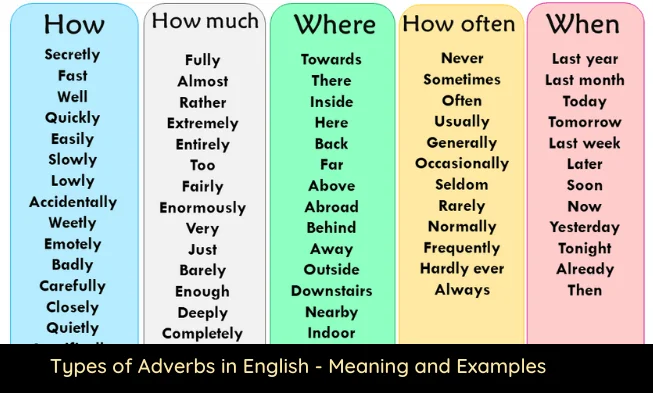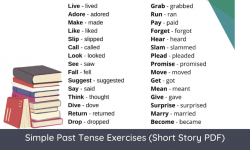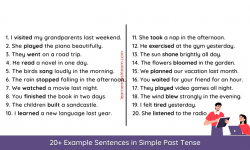Types of Adverbs in English (PDF)
Adverbs modify verbs, adjectives, or other adverbs, but never nouns. Adverbs describe when, where, why, and how something happens, adding depth and detail to sentences. In this article, you will explore 7 types of adverbs with clear explanations and examples. You can also download free Types of Adverbs and A-Z List PDF’s down below.
What Are Adverbs?

Adverbs are words that enhance the meaning of verbs, adjectives, or other adverbs. They can appear anywhere in a sentence and are crucial for describing actions and qualities. Many adverbs end in -ly, such as quickly, happily, and softly. Other adverbs, like now and often, do not end in -ly.
Tip: Adverbs are often formed by adding -ly to adjectives. For example:
- Clear (adjective) → clearly (adverb)
- Beautiful (adjective) → beautifully (adverb)
Types of Adverbs with Examples

Here are the seven main types of adverbs:
1. Adverbs of Time
- Adverbs of time describes when an action happens.
- Examples: yesterday, now, today, soon.
Example sentences:
- I will arrive soon.
- We met yesterday.
2. Adverbs of Frequency
- Adverbs of frequency explains how often an action occurs.
- Examples: always, never, sometimes, often.
Example sentences:
- I always eat breakfast at 7 AM.
- She rarely misses class.
3. Adverbs of Place
- Adverbs of place indicates where an action happens.
- Examples: here, there, everywhere, inside.
Example sentences:
- The bird flew high in the sky.
- I looked everywhere for my keys.
4. Adverbs of Manner
- Adverbs of manner describes how an action is performed.
- Examples: beautifully, quickly, carefully, gracefully.
Example sentences:
- She sings beautifully.
- He spoke clearly.
5. Adverbs of Degree
- Adverbs of degree eAdverbsxpresses the intensity or degree of an action or quality.
- Examples: very, completely, almost, totally.
Example sentences:
- The cake was very delicious.
- I am completely satisfied.
6. Adverbs of Reason
- Adverbs of reason explains why something happens.
- Examples: therefore, hence, thus, so.
Example sentences:
- I was tired, so I went to bed early.
- The store was closed; hence, I couldn’t buy what I needed.
7. Adverbs of Affirmation or Negation
- Adverbs of affirmation or negation indicates certainty or denial.
- Examples: yes, no, definitely, surely.
Example sentences:
- I will definitely be there.
- Of course, I agree with you.
Adverbs Ending in -ly
Many adverbs are formed by adding -ly to adjectives. For example:
- Happy → happily
- Quiet → quietly
- Graceful → gracefully
Examples:
- She danced gracefully.
- He handled the glass carefully.
Adverbs List PDF
Enhance your learning with these free downloadable Adverbs explained and A-Z Adverbs List with examples PDF resources:
1. Adverbs Explained PDF – download
2. A-Z List of Adverbs PDF -download
3. Adverbs Printable PDF – download
Summary Table: Types of Adverbs
| Type | Description | Examples |
|---|---|---|
| Adverbs of Time | When something happens | yesterday, soon, now |
| Adverbs of Frequency | How often something happens | always, never, sometimes |
| Adverbs of Place | Where something happens | here, there, everywhere |
| Adverbs of Manner | How something happens | beautifully, quickly |
| Adverbs of Degree | To what extent or level | very, completely, almost |
| Adverbs of Reason | Why something happens | therefore, hence, so |
| Adverbs of Affirmation/Negation | Certainty or denial | yes, no, definitely |




i like this page very much
bob the builder
Das ist Englisch?
Good morning everyone depending in time you’re in. I’m from Kenya and so glad to be with you and ready to fetch everything from you.
Best regards..
You have made some good points here. I looked on the internet for Adverbs and your article helped me a lot!
Hello
Quite reasonable material! Thank you!
Very helpful.
I agree